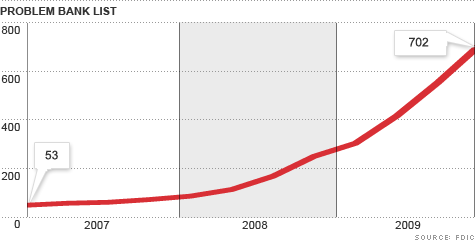Search News
 The number of lenders on the FDIC's watch list continued to mount as banks grapple with loan troubles.
The number of lenders on the FDIC's watch list continued to mount as banks grapple with loan troubles.NEW YORK (CNNMoney.com) -- More than 700 banks, or nearly one out of every 11, are at risk of going under, according to a government report published Tuesday.
The Federal Deposit Insurance Corp. said that the number of banks on its so-called "problem list" climbed to 702, its highest level since June 1993.
The number of banks under scrutiny by regulators has moved steadily higher since the recession began. Just 76 financial institutions were on the list in the fourth quarter of 2007.
Banks that end up on the problem list are considered the most likely to fail because of difficulties with their finances, operations or management.
Still, few of the lenders that are on the list actually reach the point of failure. In fact, just 13% of banks on the list have been seized and shuttered by regulators.
The names of the banks on the list are never made available to the general public by regulators out of fear that depositors at those institutions may prompt a so-called "run on the bank."
Banks have been hit hard by the troubles in the broader economy. Nearly a third of the more than 8,000 lenders across the country reported a loss for the year, the FDIC reported Tuesday.
But FDIC Chairman Sheila Bair acknowledged that while lenders are still grappling with rising losses and delinquent customers, the industry has managed to stage a dramatic comeback over the past year.
Banks collectively reported a relatively small profit of $914 million in the fourth quarter of 2009. During the fourth quarter of 2008, banks lost a combined $32.1 billion.
"Usually a lack of profits is not considered a good result, but compared to the record loss the industry reported a year ago it represents a significant improvement," she said during a press conference Tuesday.
But there is no indication things will improve anytime soon for the country's top banking regulator. With the FDIC having shuttered 20 banks so far this year, it is on track to seize at least as many financial institutions, if not more, as it did in 2009. Last year, the FDIC shut down a total of 140 lenders nationwide.
Bair confirmed that the pace of bank failures would pick up this year, which would likely put a further strain on the agency's deposit insurance fund.
This fund, which covers customer deposits when a bank fails, slipped into red last fall for the first time since 1991. The fund's deficit continued to balloon in the fourth quarter to nearly $21 billion - its largest deficit on record.
Last year, the agency took a variety of steps to help shore up the fund, including imposing a special assessment on all banks and having lenders prepay their insurance premiums for the next three years.
Bair said Tuesday that these steps, combined with some improvement in the sector, should mean that the fund will be able to handle further bank failures.
"Assuming we don't have a significantly more adverse scenario than most people think, I think we will be in good shape this year and we will start seeing the deposit insurance fund balance go back up toward the end of the year," she said. ![]()






| Index | Last | Change | % Change |
|---|---|---|---|
| Dow | 32,627.97 | -234.33 | -0.71% |
| Nasdaq | 13,215.24 | 99.07 | 0.76% |
| S&P 500 | 3,913.10 | -2.36 | -0.06% |
| Treasuries | 1.73 | 0.00 | 0.12% |
| Company | Price | Change | % Change |
|---|---|---|---|
| Ford Motor Co | 8.29 | 0.05 | 0.61% |
| Advanced Micro Devic... | 54.59 | 0.70 | 1.30% |
| Cisco Systems Inc | 47.49 | -2.44 | -4.89% |
| General Electric Co | 13.00 | -0.16 | -1.22% |
| Kraft Heinz Co | 27.84 | -2.20 | -7.32% |
|
Bankrupt toy retailer tells bankruptcy court it is looking at possibly reviving the Toys 'R' Us and Babies 'R' Us brands. More |
Land O'Lakes CEO Beth Ford charts her career path, from her first job to becoming the first openly gay CEO at a Fortune 500 company in an interview with CNN's Boss Files. More |
Honda and General Motors are creating a new generation of fully autonomous vehicles. More |
In 1998, Ntsiki Biyela won a scholarship to study wine making. Now she's about to launch her own brand. More |
Whether you hedge inflation or look for a return that outpaces inflation, here's how to prepare. More |